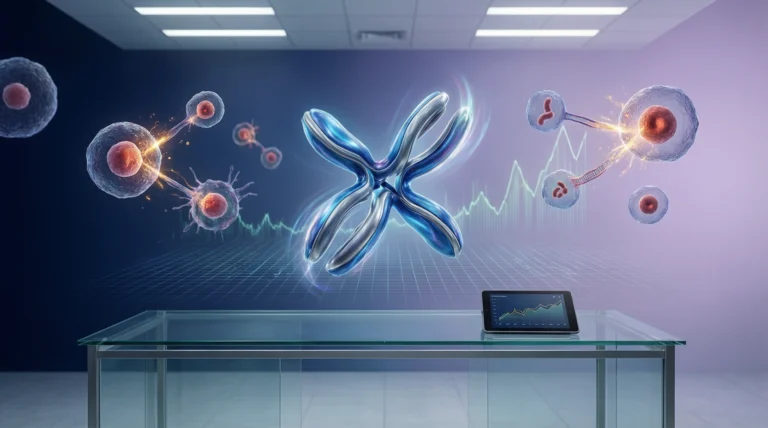
DemeRx Secures $1.7 Million NIH Grant to Advance First-in-Class Neuroplastogen DMX-1001 for Alcohol Use Disorder
DemeRx, Inc., a clinical-stage biopharmaceutical company committed to transforming addiction therapeutics through innovative neuroscience, announced that it has been awarded a $1.7 million Small Business Innovation Research (SBIR) grant from the National Institute on Alcohol Abuse and Alcoholism (NIAAA), part of the National Institutes of Health (NIH). The grant funding will accelerate the development of DemeRx’s novel neuroplastogen drug candidate DMX-1001 (noribogaine), supporting its advancement through investigational new drug (IND)-enabling studies and preparation for a Phase 2 clinical trial targeting Alcohol Use Disorder (AUD).
This milestone represents a significant endorsement from one of the world’s leading research institutions in substance abuse and addiction medicine. For DemeRx, the NIAAA grant underscores not only the company’s growing leadership in addiction science but also the transformative potential of DMX-1001 as a first-in-class therapy capable of addressing one of the most prevalent and difficult-to-treat disorders worldwide.
Addressing the Unmet Need in Alcohol Use Disorder
Alcohol Use Disorder (AUD) is a major global health crisis and one of the most common and deadly forms of addiction. According to recent U.S. health statistics, more than 29 million Americans struggle with AUD annually. The disorder contributes to substantial medical, social, and economic costs, ranking as a leading cause of preventable death in the United States. Despite its prevalence, treatment options remain limited, and access to care is alarmingly low—fewer than 5% of individuals with AUD currently receive medication-assisted therapy.
Even among those who do seek treatment, the statistics remain grim: approximately 60% relapse to hazardous drinking within six months, often due to the inability of existing therapies to adequately address the neurobiological underpinnings of addiction. These figures highlight an urgent and persistent gap in the field—one that DemeRx aims to fill through novel neuroplasticity-based therapeutics such as DMX-1001.
A New Mechanistic Approach: Neuroplasticity as the Cornerstone
Unlike conventional pharmacotherapies for alcohol dependence, which typically target single neurotransmitter systems, DMX-1001 represents a multimodal, neuroplastogen-based approach that acts across several pathways of the central nervous system. Derived from noribogaine, the active metabolite of ibogaine, DMX-1001 has been engineered to retain ibogaine’s powerful anti-addictive properties while minimizing its cardiac and hallucinogenic side effects.
DMX-1001 aims to rapidly reduce alcohol cravings and compulsive drinking behaviors by modulating key neurotransmitter systems involved in reward, stress, and impulse control. Furthermore, its neurorestorative properties promote synaptic plasticity—the brain’s ability to form new neural connections—which may help reverse the long-term cognitive and structural impairments caused by chronic alcohol exposure.
By facilitating neuroadaptation and restoring balance to disrupted neural circuits, DMX-1001 holds potential not just as a symptomatic treatment but as a disease-modifying therapy, offering patients a path toward sustained recovery and relapse prevention.
Support from the NIH and Scientific Validation
DemeRx’s award from the NIAAA under the NIH’s Small Business Innovation Research (SBIR) program (Award Number: FAIN# R43AA032127) represents a rigorous scientific validation of the company’s research direction. The SBIR program is designed to fund groundbreaking research with strong commercial potential, bridging the gap between laboratory innovation and clinical translation.
“We are immensely grateful to the NIAAA for their support of our work in developing DMX-1001,” said Deborah Mash, Ph.D., Founder and Chief Executive Officer of DemeRx. “Alcohol use disorder affects millions of families across America, and current therapeutic options remain limited. The high relapse rates seen today highlight the urgent need for more effective, neurobiologically grounded treatments. This grant not only validates our approach but also underscores the promise of DMX-1001 to offer a truly transformative solution for patients seeking lasting recovery.”
Mash, a recognized neuroscientist and a leading authority on addiction biology, has been instrumental in advancing ibogaine and noribogaine research for over two decades. Her leadership at DemeRx brings together decades of neuropharmacological expertise and a mission-driven approach to reshape addiction medicine through evidence-based innovation.
Clinical Progress and Early Results
DemeRx has already completed a Phase 1b clinical trial evaluating the pharmacokinetics, pharmacodynamics, and safety of multiple ascending doses of DMX-1001 in healthy volunteers. Results from the study demonstrated that DMX-1001 was safe, well-tolerated, and exhibited a predictable pharmacological profile, paving the way for its continued clinical advancement.
The company’s next major milestone, enabled by the new NIH funding, will be to complete the remaining IND-enabling toxicology and manufacturing studies, after which DMX-1001 is expected to enter Phase 2 clinical testing in patients diagnosed with AUD. The upcoming Phase 2 trial will assess DMX-1001’s efficacy in reducing alcohol craving, consumption, and relapse rates, as well as its impact on neural biomarkers of recovery and cognitive function.
This work aligns closely with NIAAA’s strategic priorities, which emphasize mechanism-based therapeutics capable of addressing the complex neural adaptations that underlie alcohol dependence.
Redefining the Future of Addiction Therapeutics
The broader addiction treatment landscape has long been dominated by behavioral therapies and pharmacological agents that offer modest efficacy and high relapse rates. DemeRx’s neuroplastogen platform introduces a paradigm shift—a movement away from symptom management toward neural restoration and long-term brain health.
Neuroplastogens like DMX-1001 represent a new class of compounds capable of promoting neural repair without the hallucinogenic or dissociative effects often associated with traditional psychedelics. This therapeutic category may open new avenues for treating not only AUD but also other substance use disorders, such as opioid and stimulant dependence, where neurocircuit dysfunction plays a central role.
If successful, DMX-1001 could become the first neuroplastogen-based therapy approved for addiction—a milestone that could transform both clinical practice and patient outcomes.
The Broader Mission of DemeRx
Founded with a mission to redefine addiction recovery through neuroscience, DemeRx operates at the intersection of pharmacology, psychiatry, and neurobiology. The company’s research focuses on developing non-hallucinogenic analogs of naturally derived compounds that engage the brain’s intrinsic capacity for repair and renewal.
Beyond DMX-1001, DemeRx is advancing a pipeline of therapeutic candidates aimed at addressing opioid dependence and other neuropsychiatric conditions rooted in maladaptive neuroplasticity. The company’s integrated development model—combining translational neuroscience, clinical rigor, and regulatory strategy—positions it as a pioneering force in next-generation addiction medicine.
For patients and families affected by alcoholism, DemeRx’s work represents hope for a new era of treatment, one that moves beyond detoxification and abstinence toward neural healing and sustained remission.
About DemeRx, Inc.
DemeRx, Inc. is a clinical-stage biopharmaceutical company dedicated to transforming addiction therapeutics and improving outcomes for individuals struggling with substance use disorders. Through advanced scientific research and strategic clinical development, DemeRx is advancing DMX-1001 (noribogaine) as a groundbreaking therapeutic solution for Alcohol Use Disorder (AUD). The company’s research builds on decades of academic and clinical insight into neuroplasticity, addiction mechanisms, and translational pharmacology.
For more information about DemeRx and its ongoing clinical programs, please visit www.demerx.com.




